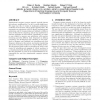Free Online Productivity Tools
i2Speak
i2Symbol
i2OCR
iTex2Img
iWeb2Print
iWeb2Shot
i2Type
iPdf2Split
iPdf2Merge
i2Bopomofo
i2Arabic
i2Style
i2Image
i2PDF
iLatex2Rtf
Sci2ools
109
click to vote
EXPCS
2007
2007
The user in experimental computer systems research
Experimental computer systems research typically ignores the end-user, modeling him, if at all, in overly simple ways. We argue that this (1) results in inadequate performance evaluation of the systems, and (2) ignores opportunities. We summarize our experiences with (a) directly evaluating user satisfaction and (b) incorporating user feedback in different areas of client/server computing, and use our experiences to motivate principles for that domain. Specifically, we report on user studies to measure user satisfaction with resource borrowing and with different clock frequencies in desktop computing, the development and evaluation of user interfaces to integrate user feedback into scheduling and clock frequency decisions in this context, and results in predicting user action and system response in a remote display system. We also present initial results on extending our work to user control of scheduling and mapping of virtual machines in a virtualization-based distributed computing ...
Related Content
| Added | 16 Aug 2010 |
| Updated | 16 Aug 2010 |
| Type | Conference |
| Year | 2007 |
| Where | EXPCS |
| Authors | Peter A. Dinda, Gokhan Memik, Robert P. Dick, Bin Lin, Arindam Mallik, Ashish Gupta, Samuel Rossoff |
Comments (0)

